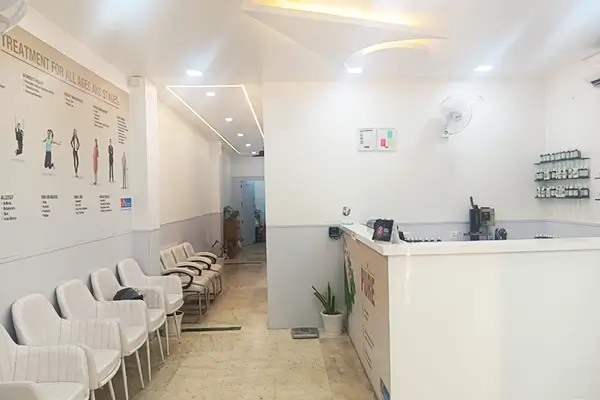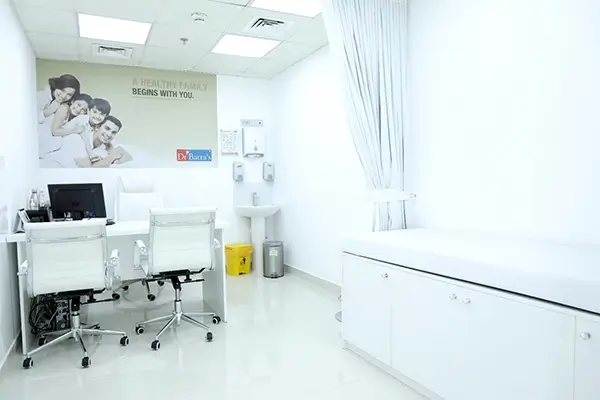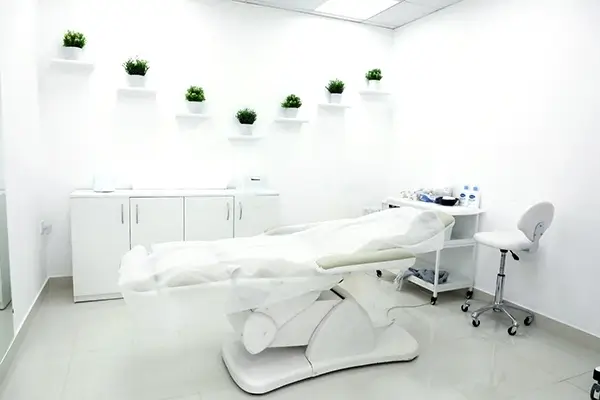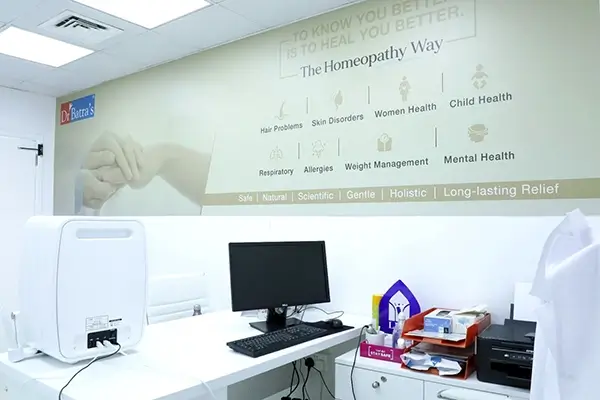

Wart treatment in Dubai is now safer and easier with expert care at Dr Batra's® UAE clinics. Warts can be an unwelcome and stubborn problem, but you don’t have to deal with them alone. We offer non-invasive and effective wart removal treatments that address the root cause of the issue.
With over 40 years of experience in homeopathy, our expert doctors use scientifically backed homeopathic remedies to treat warts naturally and gently. Whether caused by viral infections like HPV or other factors, our treatments work to strengthen your immune system, reduce recurrence, and promote long-term healing.
At Dr Batra's® clinics in Dubai and Abu Dhabi, your health and comfort are our top priorities. Our team takes the time to understand your concerns and create a personalized treatment plan that fits your unique needs.
Choose a treatment that is trusted by millions worldwide and backed by a strong track record of success. Book your consultation today at Dr. Batra's® UAE clinics and take the first step toward clear, healthy skin.
With over 40 years of unwavering commitment to homeopathic healthcare, Dr Batra's® is a trusted name in treating warts and other dermatological concerns. Our rich legacy ensures patients receive reliable and effective care.
At Dr Batra's®, our team consists of seasoned doctors extensively trained to address various skin concerns, including warts. Their expertise ensures patients receive top-tier, specialized care.
Every patient is unique, and so is our approach. We create tailored treatment plans that address not only the physical cause of warts but also the emotional well-being of our patients, recognizing the impact of stress and other underlying factors.
Our doctors prioritize a comprehensive care model. They meticulously assess medical history, lifestyle, and other contributing factors to deliver holistic treatments that address both the physiological and psychological aspects of the condition.





Warts, scientifically known as Verruca Vulgaris, are small, often rough growths caused by the human papillomavirus (HPV). These benign skin infections commonly appear on the hands, feet, and mucous membranes, but they can occur anywhere on the body.
Warts are generally harmless and may go away on their own, but they can be bothersome, embarrassing, or even a social inconvenience for some individuals.
Studies, including those by the NCBI, highlight that approximately 10% of the population is affected by warts. Their contagious nature makes them easily spread through direct skin-to-skin contact or by touching surfaces contaminated with the virus.
While warts are usually painless, professional management is crucial if they cause discomfort, spread, or do not resolve on their own. Treatment options vary depending on the location and type of warts and may include homeopathy, cryotherapy (freezing), topical medications, or minor surgical procedures. Seeking professional advice ensures effective and personalized care, helping prevent the spread and recurrence of warts.
There are several types of warts, each named based on their location on the body and their appearance. The most common types of warts include:
These warts typically appear on the hands, fingers, and around the nails. They are small, rough growths that may have a cauliflower-like appearance. Common warts often have a rough surface and can be flesh-colored, grayish, or brown.
Plantar warts develop on the soles of the feet, primarily on weight-bearing areas such as the heels or balls of the feet. They can be painful, especially when walking or standing, and may feel like a small pebble in the shoe. Plantar warts are often flat and may have black dots (tiny blood vessels) on their surface.
These warts are small, smooth, and flat-topped, with a flesh-colored appearance. Flat warts can occur in large numbers, often in clusters, and are most commonly found on the face, neck, hands, and legs.
Genital warts are a sexually transmitted infection (STI) caused by certain strains of HPV. They can appear on the genitals, groin, thighs, or anus and may vary in size and appearance. Genital warts can be raised or flat, single or multiple, and may cause itching, discomfort, or bleeding during sexual intercourse.
These warts are long, narrow growths that typically appear on the face, particularly around the eyes, nose, or mouth. Filiform warts often have a thread-like or finger-like appearance and may be flesh-colored, pink, or brown.
Periungual warts develop around the nails and can be particularly troublesome because they can affect nail growth and cause pain or discomfort. They may appear as rough, irregular growths and can distort the shape of the nail.
Mosaic warts are clusters of plantar warts that grow closely together in a mosaic-like pattern. They can be particularly resistant to treatment due to their size and proximity.
It's important to note that while most warts are harmless, some types, such as genital warts, may require medical attention and treatment. Additionally, some individuals may be more prone to certain types of warts based on factors such as genetics, immune function, and environmental exposure.
Homeopathy approaches the treatment of warts holistically, aiming to stimulate the body's natural healing mechanisms rather than merely addressing the symptoms.
Homeopathic remedies are derived from natural substances and are prescribed based on the individual's specific symptoms, constitution, and overall health.
The selection of the remedy takes into account various factors such as the size, shape, color, and location of the warts, as well as any accompanying symptoms like itching, burning, or bleeding.
Homeopathy views warts as an external cause of an internal imbalance or susceptibility, and treatment is aimed at addressing this underlying imbalance. By stimulating the body's vital force, homeopathy seeks to strengthen the immune system's response to the human papillomavirus (HPV) infection, which warts.
This approach aims for long-lasting relief and aims to prevent the recurrence of warts by addressing the root cause rather than merely suppressing warts symptoms.
Furthermore, homeopathy considers the individual's overall health and emotional state, as stress and emotional factors can influence the susceptibility to warts.
By taking a holistic approach to treatment, homeopathy not only targets the physical symptoms but also aims to promote overall well-being and balance. It's important to consult with a qualified homeopathic doctor for personalized warts removal treatment and guidance tailored to your specific needs and circumstances.
Warts are triggered by a viral infection from the human papillomavirus (HPV) family. This virus prompts an overproduction of keratin, a crucial protein in the skin's outer layer, leading to the formation of tough, thickened skin in the affected area.
Though generally harmless, warts can be unsightly and uncomfortable. While HPV comprises numerous strains, only a few induce wart development, which usually doesn't pose a significant health risk.
However, HPV is one of the most common sexually transmitted infections, with many sexually active individuals encountering it at some point. Though some may carry the virus without symptoms, others may develop genital warts, potentially increasing the risk of certain cancers.
It's advisable to seek medical advice upon the appearance of genital warts for accurate diagnosis and appropriate skin treatment. Additionally, taking a skin evaluation test can help understand wart disease symptoms better.
The signs and warts symptoms can vary depending on their type and location, but generally include:
It's important to note that warts are contagious and can spread through direct skin-to-skin contact or indirectly through contact with contaminated objects or surfaces.
Several factors can increase the risk of developing warts. These include:
By understanding these risk factors, individuals can take steps to reduce their risk of developing warts, such as practicing good hygiene, avoiding skin-to-skin contact with warts, and maintaining a healthy immune system.
While many warts can be treated at home with over-the-counter remedies, there are situations where it's advisable to see a doctor:
Remember, early intervention and appropriate wart removal treatment can help prevent complications and improve outcomes. If in doubt, it's always best to err on the side of caution and consult a healthcare professional.
In conclusion, managing and wart removal treatment effectively requires understanding their causes, types, and treatment options. While homeopathic skin treatment offer a holistic approach to addressing warts, seeking professional guidance is paramount for personalized advice and treatment.
Healthcare professionals can provide tailored solutions based on individual circumstances, ensuring effective management and resolution of warts. Additionally, prevention strategies, such as practicing good hygiene and maintaining a healthy immune system, can help reduce the risk of developing warts.
Ultimately, consulting a healthcare professional for personalized advice is essential in addressing warts and achieving optimal skin health.
Yes. Homeopathy is a safe and effective treatment option for skin warts. A recent study by the Indian Journal of Drugs in Dermatology, examining the use of homeopathy for various types of warts showed that 18 out of 19 people with plantar warts (which appear on the soles of the feet) were cured on average within 2.2 months.
Warts can be effectively treated with homeopathy. Homeopathic remedies work by stimulating the body's natural healing mechanisms to eliminate warts from the root without any side effects. The most effective homeopathic treatment for warts depends on the individual's symptoms, medical history, and the type of wart they have.
Warts are caused by the human papillomavirus (HPV) and there is no direct evidence that a nutrient deficiency causes them. However, a weakened immune system can increase the risk of developing warts.
Essential vitamins and minerals such as vitamin C and zinc support a strong immune system. Practicing good hygiene, avoiding skin-to-skin contact with infected individuals, and maintaining a healthy lifestyle can reduce the risk of developing warts.
The cost of warts removal in Dubai can vary depending on several factors such as the type and location of the wart, the method of removal, and the healthcare provider.
Generally, the cost of warts removal in Dubai can range from AED 500 to AED 3000 or more. It is advisable to consult Dr Batra's® UAE to determine the most suitable and cost-effective warts removal treatment option for an individual's specific condition.
In most cases, warts do not require surgery and can be treated with non-surgical methods such as homeopathy. Homeopathy offers a safe and effective wart removal treatment by stimulating the body's natural healing processes to eliminate warts from the root without any side effects.
Consulting Dr Batra's® UAE can help determine the most effective treatment for an individual's specific condition. Surgery may be necessary in some cases, but Dr Batra's® homeopathy offers a non-invasive and more cost-effective wart removal treatment option.